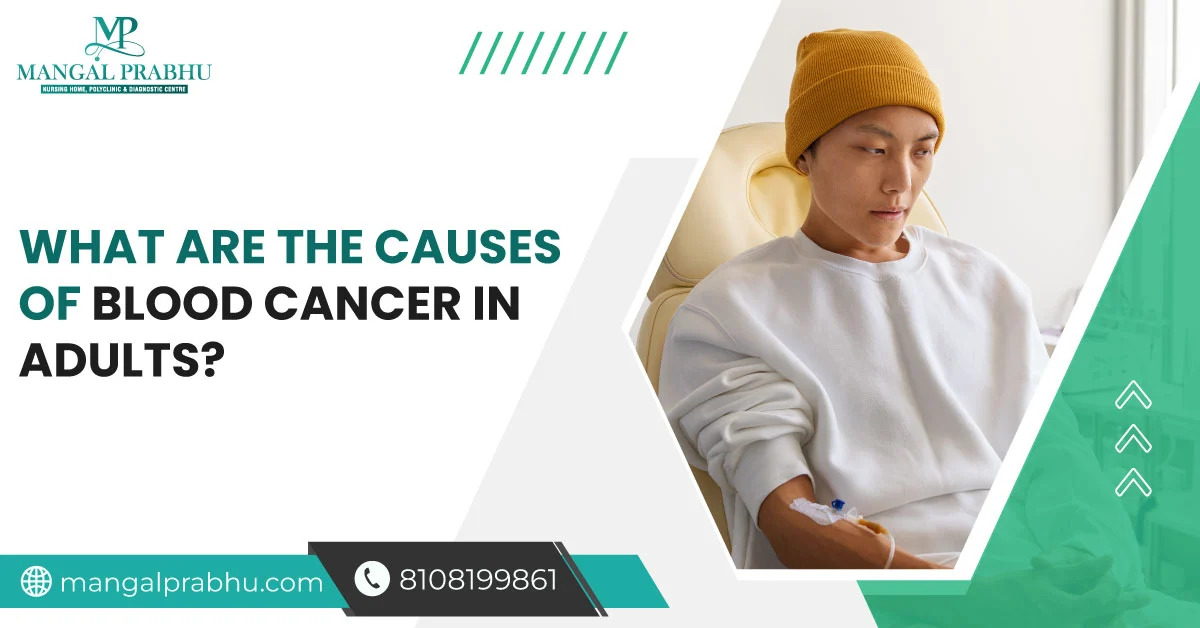
What are the Causes of Blood Cancer in Adults?
1. What is Blood Cancer?
Blood cancers block the ability of normal developing blood cells to produce important cells in the body, and, as a result, complications like infections, anemia, and excessive bleeding for patients may arise. Even though the actual causes of blood cancer are yet unknown, scientists suggest that it’s the cooperation between the genetic and the environmental components that determines it.
However, consulting with the best Hematologist in Navi Mumbai can help you eliminate the potential risk of blood cancer. This article comprehensively takes a look at blood cancer, its symptoms, diagnosis options and treatment modalities.
2. Causes of Blood Cancer in Adults
a. Genetic Factors
Inherited genetic mutations can increase the risk of cancer, disrupting the harmonious growth and division of blood cells and paving the way for cancerous insurgencies.
b. Viral Infections
The Epstein-Barr virus (EBV) and its cohorts can sow discord within the immune defenses, creating fertile ground for the malignant transformation of blood cells.
c. Chemical Exposure
Chemicals like benzene and pesticides play a villainous role. Their prolonged exposure can open dramatic mutations within blood cell DNA, increasing the risk of blood cancer.
d. Age and Gender
Life’s passage leaves its marks, and advancing age is a prominent element in the blood cancer journey. Yet, gender, too, has its say, with certain types of blood cancer favoring the script of masculinity.
e. Lifestyle Factors (Smoking, Alcohol)
The smoke of tobacco and the intoxicating allure of alcohol can blur the lines of immune vigilance, increasing the risk of cancer.
3. Symptoms of Blood Cancer
The manifestations of blood cancer can appear diverse according to the type of the disease. Common symptoms include:
- Fatigue and weakness
- Frequent infections
- Easy bruising or bleeding
- Unexplained weight loss
- Swollen lymph nodes
- Breath shortens, or nights become even more uncomfortable than before because of the night sweats.
- Bone pain or tenderness
4. Diagnosis and Treatment Options
If you notice any kind of clinical symptoms of blood cancer, you should immediately consult the best Blood Cancer Treatment Hospital in Navi Mumbai, like Mangal Prabhu Hospital who will provide you with full examinations to determine the cause. To diagnose blood cancer, your doctor may recommend several diagnostic tests like blood tests, bone marrow aspiration and biopsy, and imaging techniques (X, CT, or PET scans).
The exact treatment approach for blood cancer significantly depends on different factors that concern the type of blood cancer, its stage and your health status. Common treatment options include chemotherapy for calculated strikes, radiation for focused energies, targeted therapy for precision, and stem cell transplantation for the transportation of life’s marrow—all stand as pillars of hope against this relentless cancer.
5. Conclusion
In the tapestry of life’s complexities, blood cancer stands as a testament to resilience and exploration. Understanding its causes unveils not just scientific mysteries but also prompts a reflection on choices and their impacts. Considering the best hospitals like Mangal Prabhu Hospital, their prevention, early detection, and compassionate care can help you fight blood cancer and its potential risk.
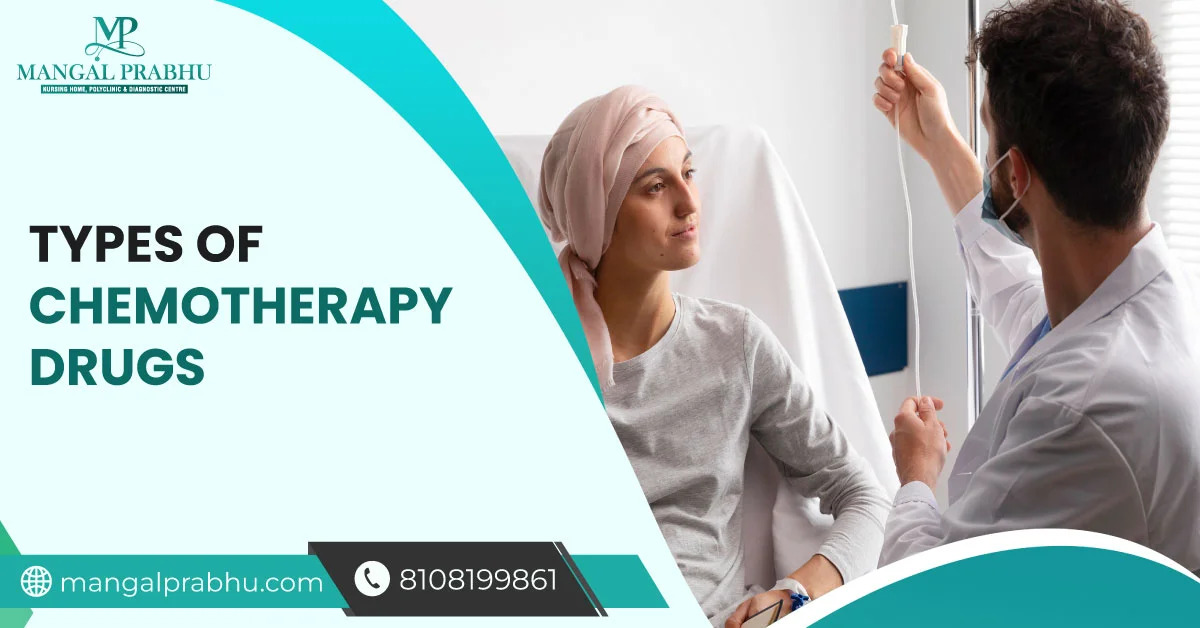
Types of Chemotherapy Drugs
Chemotherapy—the most commonly used treatment approach for cancer—is believed to kill most types of the fastest-growing cells in the human body. The treatment involves different types of drugs, which are effective for various forms and stages of cancer.
These drugs, however, come with certain side effects, as they tend to kill healthy cells, too. It’s important to discuss the benefits and potential risks of chemo with a cancer specialist in Navi Mumbai before considering it. In the meantime, let’s see what chemotherapy involves and how it treats cancer.
Common Types of Chemotherapy Drugs
Chemotherapy drugs are categorized into the following types:
i) Alkylating Agents:
These cancer-killing cells destroy the DNA within the rapidly growing cells, thus preventing their multiplication and growth. The drugs are mainly used for cancers that develop gradually. Examples of alkylating agents include melphalan, temozolomide, cisplatin, busulfan, and Chlorambucil.
ii) Antimetabolites:
These drugs work by pretending to be the nutrients a cell requires for growth, eventually destroying the cancer cells by starving them to death.
iii) Anti-tumor Antibiotics:
These antibiotics destroy the DNA cells that tend to replicate quickly.
iv) Plant Alkaloids:
Mitosis is a medical procedure that affects the ability of cancer cells to grow and divide. Plant Alkaloids, also called mitotic inhibitors, contain the same compound that plants use to protect themselves from predators.
How Chemotherapy Drugs Work
Normal cells in the human body follow a cell cycle, copying DNA material to multiply and then dying when their work is done. Cancer cells, however, never die. They keep replicating the DNA within them and divide rapidly, spreading throughout the body.
These cells form tumors, which, in turn, affect your healthy organs. The goal of chemotherapy treatment in Navi Mumbai is to disrupt this cell cycle by killing cancer cells or interfering with their ability to divide.
Benefits of Chemotherapy Drugs
- It kills cancer cells so that they don’t grow and spread.
- It can shrink the tumor so that your surgeon can surgically remove it.
- The treatment increases your chances of living a healthy and longer life.
Potential Side Effects
While chemotherapy is an effective treatment for different types of cancers, it comes with its share of side effects. The treatment kills other fastest-growing cells in your body, such as the blood-forming cells or the hair follicles. The procedure can lead to:
- Hair loss
- Mouth ulcers
- Digestive issues like vomiting, diarrhea, and constipation
- Loss of appetite
- Fatigue
Tips for Managing Side Effects
Your healthcare provider will prescribe anti-nauseous drugs that can help fight nausea and vomiting. Likewise, depending on your symptoms, they will recommend medications that keep your digestive system in good shape and prevent other side effects. Here’s what else may work:
- Take ample rest
- Practice meditation, yoga, and exercise daily
- Eat small and frequent meals
- Use high-quality hair care products to keep your scalp moisturized and nourished
- Consider counseling
Conclusion
Chemotherapy has saved the lives of many cancer patients. The disease, which was once considered life-threatening, is now treatable with chemotherapy. Chemotherapy can be used as a standalone procedure or in conjunction with surgery and radiation therapy for the best outcome.

Breast Cancer Stage 1 Symptoms & Treatment Options
Breast cancer is an extensive issue that should have to be dealt with as initially as possible in order to prevent terrible future outcomes. Breast cancer has various stages among its stages. The breast cancer stage has its significance because early detection of breast cancer can make a whole lot of difference.
What is Breast Cancer Stage 1?
Breast cancer stage 1 is the starting stage of the disease; it is set apart in the presence of cancerous cells, which can be in the breast tissues or nearby lymph nodes. Cancer Specialists in Navi Mumbai treat patients with breast cancer with the best care; in the beginning phase, the tumor’s size is usually small; on measuring, it is shown to be not more than 2 centimeters in diameter and does not spread beyond the size of its origin.
Common Symptoms of Breast Cancer Stage 1
It is possible that the symptoms of stage one breast cancer can not be noticed as it is too small. However, there still are changes that can be noticeable; these include the presence of a lump or mass in the breast, a change in breast size or shape, nipple discharge(other than breast milk), breast skin changes like redness, puckering, dimpling and continuous breast pain. It is crucial to understand that these changes can be an indication of an early stage of breast cancer. If you face any of these symptoms, then you need to visit a healthcare professional like Mangal Prabhu Hospital to get an outstanding treatment.
Also Read: Understanding Chemotherapy for Breast Cancer
Diagnosis and Treatment Options for Stage 1 Breast Cancer
Often, Diagnosis is effective for managing breast cancer stage 1. Diagnosis commonly includes a combination of imaging tests like mammograms, ultrasound, MRIs and tissue biopsies to make sure there is any presence of cancerous cells and the stage of the disease.
Treatment for 1st stage cancer can be different to different individuals as it is based on factors like tumor size, overall health and hormone receptor status. The common procedure is surgical intermediation, such as lumpectomy(removal of the tumor and a small margin of surrounding tissue) or mastectomy (removal of the entire breast). Moreover, therapy, like radiation therapy and chemotherapy, is done to find and remove any remaining cells that can lead to breast cancer again. It is important to get treatment from a specialist. Breast Cancer Treatment in Navi Mumbai offerstop-notch handling, for that matter.
Living with Stage 1 Breast Cancer: Lifestyle Changes and Support
The news of diagnosis is indeed a news of fear and uncertainty. Nevertheless, suitable medical treatment and adopting a better lifestyle can help in overall well-being and recovery. It is important to avoid tobacco and alcohol consumption and intake of others that include maintaining a nutritious diet, fruits, vegetables, lean protein and whole grains, involving yourself in physical activity and managing stress through relaxation techniques.
Conclusion
You can visit Mangal Prabhu Hospital if you face any symptoms to get treated as soon as possible; being concerned about the awareness of potential symptoms and having conscious healthcare can help in detecting stage 1 breast cancer that can avoid bigger surgeries in future.
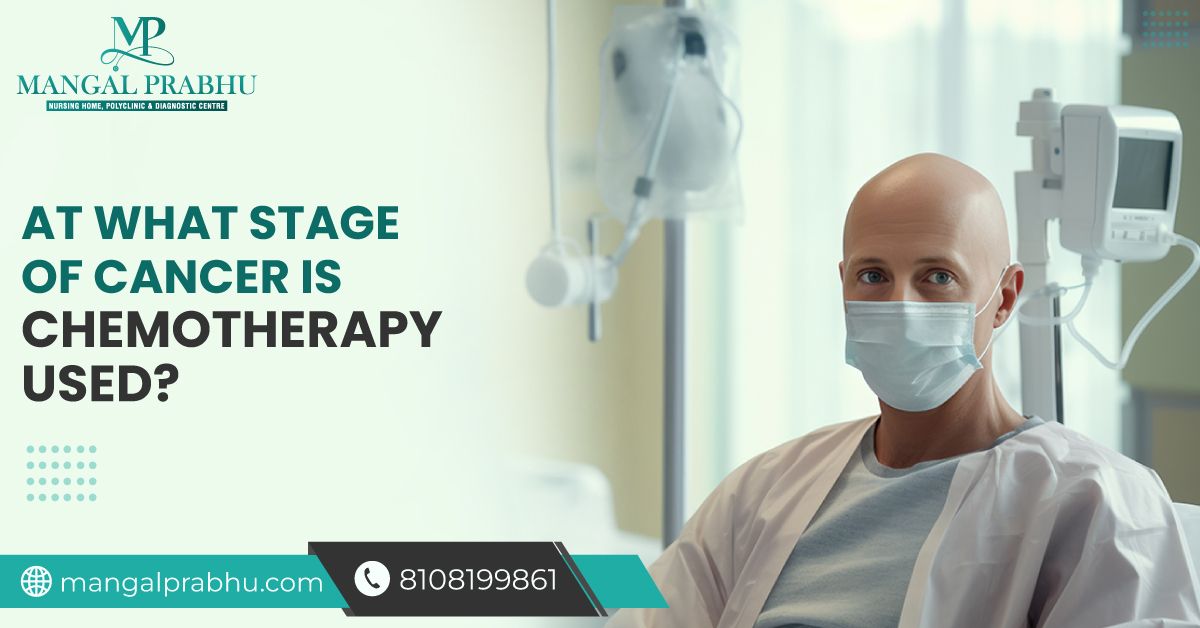
At What Stage of Cancer Is Chemotherapy Used?
Chemotherapy is a combination of medications used to kill cancer cells that are growing aggressively and spreading to your different organs. Chemotherapy treatment in Navi Mumbai is recommended for patients diagnosed with different stages of cancer.
It’s considered an effective treatment option for all types of cancers. The type of chemotherapy your doctor advises depends on the stage, type, and severity of the cancer. They might also factor in your age and health goals to determine the most suitable treatment option.
The Different Stages of Cancer
Chemotherapy can be given for stage I to stage IV cancer patients. Most types of cancer are categorized into four stages, and the diagnosis is done based on how aggressive the cancer cells are, where they have spread, and the patient’s health. For most types, cancer in its first stage is restricted to a specific organ, while the same in stage IV is considered metastatic cancer that has spread to the surrounding organs, probably throughout the body.
Here’s how chemotherapy is planned for different stages of cancer.
Stage 1:
Chemotherapy combined with surgery
Stage 2:
A surgical removal of the malignant tumor and several sessions of chemotherapy.
Stage 3A:
Chemotherapy with surgery or surgery followed by chemotherapy, radiation therapy, and immunotherapy, depending on the location of the cancer. If the cancer can’t be removed surgically, then a combination of chemotherapy, immunotherapy, and radiation therapy is prescribed.
Stage 3B and 3C:
Chemotherapy with multiple rounds of radiation therapy followed by surgery and immunotherapy.
Stage 4:
Chemotherapy, targeted therapy, surgery (if possible), followed by more rounds of chemotherapy.
Types of Chemotherapy Drugs
Chemotherapy drugs are a combination of medications consisting of the following:
i) Alkylating Agents:
These are responsible for destroying the DNA of the replicating cancer cells.
ii) Antimetabolites:
These drugs can destroy cancer cells when they are about to grow out of control in your body. Antimetabolites work for breast, ovarian, and other types of cancer.
iii) Antitumor:
The medication changes the DNA structure of cancer cells, restricting their growth and multiplication inside the body. Mitotic inhibitors are also commonly used to treat cancer cells, but they contain a compound that might destroy healthy cells, as well. So, their use is often limited to certain types of cancers.
Benefits of Chemotherapy
Chemotherapy is the most viable cancer treatment for people diagnosed with cancer in different stages and severity statuses. Here’s how it benefits:
- Restrict the growth of the tumor or shrink its size to make surgical removal of the cancer possible
- Prevent the cancer cells from dividing
- Reduces the risk of relapse
Potential Side Effects
Oncologists in Navi Mumbai recommend chemotherapy after considering your age, size, type of cancer, and your health. Before you choose this treatment, know that it comes with side effects. These may vary depending on the chemo drugs used, but some common side effects found in most patients include:
- Fatigue
- Nausea and vomiting
- Diarrhea
- Hair loss
- Mouth sores
- Loss of appetite
- Anemia
- Weakness in muscles
Schedule an appointment with your healthcare to discuss the most suitable chemotherapy option, the length of the treatment, and the risks.
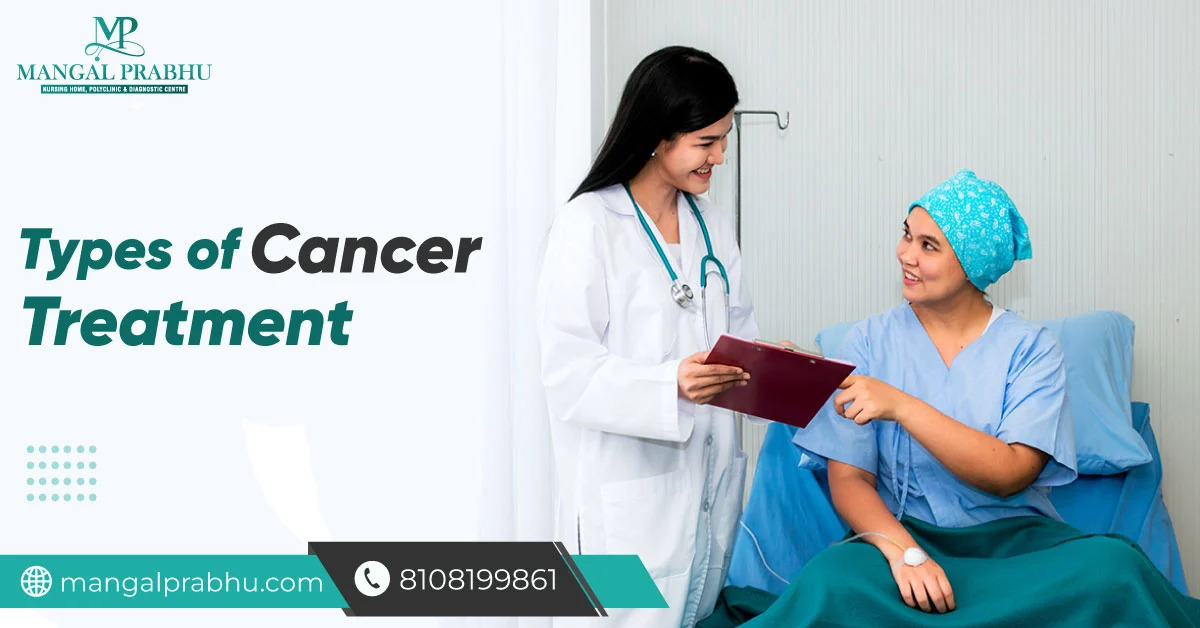
Types of Cancer Treatment
Cancer is caused due to uncontrolled cellular growth due to various factors. Besides the severity and complications associated with cancer, this condition is also hard to diagnose and treat. Cancer treatment helps in treating and preventing further risk of different types of cancers. However, if left unchecked, this rebel cell and its cohorts could wreak havoc on the overall well-being. Thus, it would be best to visit the best Cancer Hospital in Navi Mumbai like Mangal Prabhu to efficiently treat cancer and eliminate the risk of its occurrence. The different types of cancer treatment plans treat various cancer problems that help a patient effectively get through issues and improve strength and mobility. Therefore, this guide provides insight into different types of cancer treatment.
1) Surgery
With surgical precision, surgeons infiltrate cancerous cells, gathering intelligence on the cancer’s stage and extent, guiding the army of treatments in their strategic assault. Every surgeon is unique, and surgery tailors its approach to each individual, adapting its tactics to the specific challenges presented by the terrain of each patient’s body.
2) Radiation Therapy
In radiation therapy beams of energy pierce through the darkness, targeting cancer cells with unerring accuracy. It is the best way of destruction, where DNA is shattered, and cancer’s grip is loosened. An individual may also feel fatigue and burns, but all these things are worth removing cancer cell by cell.
3) Chemotherapy
In the realm of chemotherapy, drugs surge through the veins, laying waste to cancer’s strongholds. It helps in reducing the size of the tumour and also reduces the number of cancerous cells in the body which help in reducing the spread of this issue.
Also Read: How Chemotherapy Is Done?
4) Immunotherapy
The body has its defences that help in the fight against the cancerous cell. Immunotherapy strategy helps in improving the defence ability to fight against cancer. And in the wake of battle, there’s not just victory but resilience—a strengthened immune system, primed to defend against future assaults.
5) Targeted Therapy
Doctors mark molecules for destruction, pathways blocked, and vulnerabilities exploited. By targeting specific vulnerabilities in cancer cells, these experts sabotage their growth and cripple their defences. Targeted treatment zeroes in on specific targets (molecules) in cancer cells. These targets play a role in how cancer cells grow and survive. Using these targets, the drug disables the cancer cells so they cannot spread.
6) Hormone Therapy
Hormone therapy is like a precision strike against cancers that rely on hormones to grow and spread, such as certain types found in the breast, prostate, and ovaries. It’s the strategic move that either removes or blocks the body’s natural hormone production, essentially cutting off the fuel supply for cancer growth. A Cancer Specialist in Navi Mumbai at Mangal Prabhu might opt for a bold manoeuvre, surgically removing hormone-producing organs like the ovaries or testes.
Conclusion
In the vast canvas of battling cancer, each treatment method offers its way through the tapestry of human perseverance. From the surgical procedure to the pinpoint accuracy of targeted therapies, healthcare providers march forward together in the pursuit of triumph.
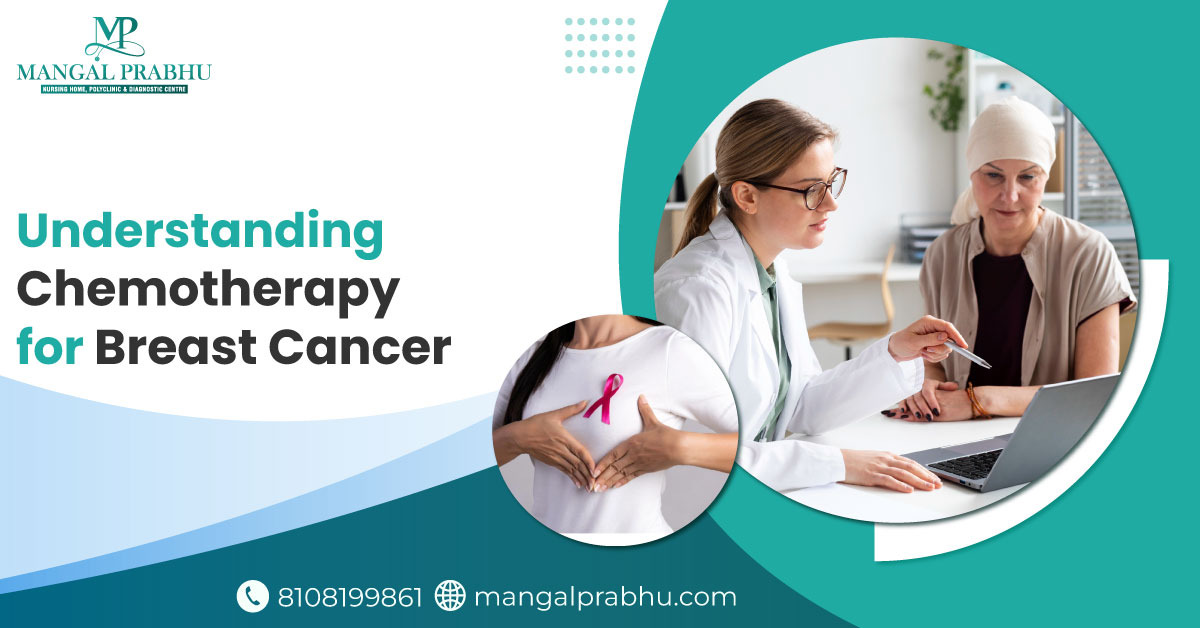
Understanding Chemotherapy for Breast Cancer
When it comes to combating breast cancer, a multidimensional approach is often required. Chemotherapy Treatment in Navi Mumbai is pivotal in eradicating cancer cells throughout the body. Breast cancer is a formidable adversary, and in the arsenal of treatments available, chemotherapy stands as a powerful weapon against its progression. In this comprehensive guide, you can learn more about chemotherapy for breast cancer, exploring its mechanisms, risks, benefits, and crucial role in the overall treatment landscape.
What is Chemotherapy?
Chemotherapy is a medical treatment that utilizes drugs to target and destroy rapidly dividing cells, such as cancer cells. Unlike localized treatments such as surgery or radiation therapy, chemotherapy circulates throughout the bloodstream, reaching cancer cells that may have spread to other body parts.
How Does Chemotherapy Work for Breast Cancer?
Chemotherapy is a dynamic player in the breast cancer treatment arena, strategically deployed at different phases of the patient’s journey. In the pre-surgical phase, known as neoadjuvant chemotherapy, it shrinks tumors, facilitating more effective surgical removal.
Post-surgery, adjuvant chemotherapy takes the stage, aiming to eradicate any residual cancer cells, minimizing the risk of recurrence. The drugs utilized in chemotherapy exert their impact by disrupting the cell division process, impeding the growth and spread of cancer cells.
This dual approach, targeting both pre- and post-operative stages, showcases the versatility and effectiveness of chemotherapy in comprehensively managing breast cancer.
What Are the Risks and Side Effects of Chemotherapy?
While chemotherapy is a potent weapon, it is not without its challenges. Common side effects include fatigue, nausea, hair loss, and a heightened infection susceptibility. It is essential to acknowledge these potential side effects while recognizing that advancements in medical science continuously strive to minimize the impact on a patient’s quality of life.
Also Read: How Chemotherapy Is Done?
What Are the Benefits of Chemotherapy for Breast Cancer?
The benefits of chemotherapy in treating breast cancer are multifaceted.
1) Tumor Size Reduction
Chemotherapy effectively targets and reduces the size of breast tumors, facilitating a more manageable surgical intervention.
2) Risk Reduction for Cancer Recurrence
By eradicating cancer cells that may remain after surgery, chemotherapy significantly lowers the risk of cancer recurrence.
3) Enhanced Surgical Success
Administering chemotherapy post-surgery ensures the elimination of any residual cancer cells, enhancing the success of surgical procedures.
4) Holistic Treatment Approach
Integrating chemotherapy into a comprehensive treatment plan addresses cancer from multiple angles, leading to a more thorough and effective therapeutic strategy.
5) Long-Term Survival Rates
The multifaceted benefits of chemotherapy contribute to improved long-term survival rates, offering individuals battling breast cancer a more favorable prognosis.
6) Systemic Cancer Cell Targeting
Chemotherapy’s systemic nature allows it to target cancer cells throughout the body, addressing potential metastases and minimizing the risk of distant recurrence.
Conclusion
In breast cancer treatment, chemotherapy plays a dynamic and indispensable role. Its ability to target cancer cells systemically makes it a crucial component of a comprehensive treatment strategy. For individuals confronting breast cancer, collaboration with a specialized medical team, including a Breast Cancer Specialist in Navi Mumbai, is essential. Mangal Prabhu Hospital is a beacon of healthcare excellence, providing state-of-the-art facilities and a dedicated team of experts to guide patients through their breast cancer journey.

How Chemotherapy Is Done?
Introduction to Chemotherapy
The journey through cancer treatment often involves various therapeutic approaches, and one of the most well-known is chemotherapy. This widely recognized treatment plays a crucial role in combating cancer cells, and understanding how chemotherapy is administered can empower individuals facing cancer. In Navi Mumbai, centers like Mangal Prabhu Hospital offer comprehensive care under the expertise of skilled Oncologists in Navi Mumbai.
What is Chemotherapy?
Chemotherapy, often referred to as “chemo,” is a medical treatment that employs powerful drugs to target and destroy rapidly dividing cells. While cancer cells are the primary target, chemotherapy can also affect healthy cells that divide quickly, such as bone marrow, digestive tract, and hair follicles.
What is the Purpose of Chemotherapy?
The primary goal of chemotherapy is to eliminate or control the growth of cancer cells. It can be used at different stages of cancer treatment:
a) Before Surgery:
Neoadjuvant chemotherapy aims to shrink tumors before surgery, making them more manageable to remove.
b) After Surgery:
Adjuvant chemotherapy is administered after surgery to eliminate any remaining cancer cells and reduce the risk of recurrence.
c) Primary Treatment:
In cases where surgery or radiation therapy may not be viable, chemotherapy is the immediate treatment.
d) For Palliative Care:
In advanced stages, chemotherapy can alleviate symptoms and improve the quality of life.
How Chemotherapy is Done?
The process of chemotherapy involves several key steps:
A) Consultation and Planning:
Patients undergo a thorough consultation with an oncologist before initiating chemotherapy. A personalized treatment plan is developed based on cancer type, stage, overall health, and medical history.
B) Drug Administration:
Chemotherapy drugs can be administered in various ways, including intravenously (IV), orally (in the form of pills or liquids), or through injections. The chosen method depends on the specific drugs and the patient’s condition.
C) Treatment Cycles:
Chemotherapy is often administered in cycles, each consisting of a treatment period followed by a rest period. This approach helps minimize damage to healthy cells and allows the body to recover.
D) Outpatient or Inpatient:
Depending on the intensity and duration of treatment, chemotherapy sessions may be conducted on an outpatient basis, allowing patients to return home afterward or in an inpatient setting for more extensive regimens.
What are the Side Effects of Chemotherapy?
While chemotherapy is a powerful tool against cancer, it can also lead to side effects due to its impact on average, rapidly dividing cells. Common side effects may include:
- Fatigue
- Nausea and Vomiting
- Hair Loss
- Bone Marrow Suppression
- Gastrointestinal Issues
- Mouth Sores
- Neuropathy
Conclusion
Chemotherapy is a dynamic and evolving aspect of cancer treatment, representing a cornerstone in the fight against this formidable disease. In Navi Mumbai, facilities like Mangal Prabhu Hospital, with dedicated oncologists, play a vital role in providing comprehensive Chemotherapy Treatment in Navi Mumbai. While the process can be challenging, understanding the purpose, procedure, and potential side effects empowers individuals on their cancer journey. With ongoing advancements in medical science, chemotherapy significantly improves outcomes and enhances the quality of life for those undergoing cancer treatment.
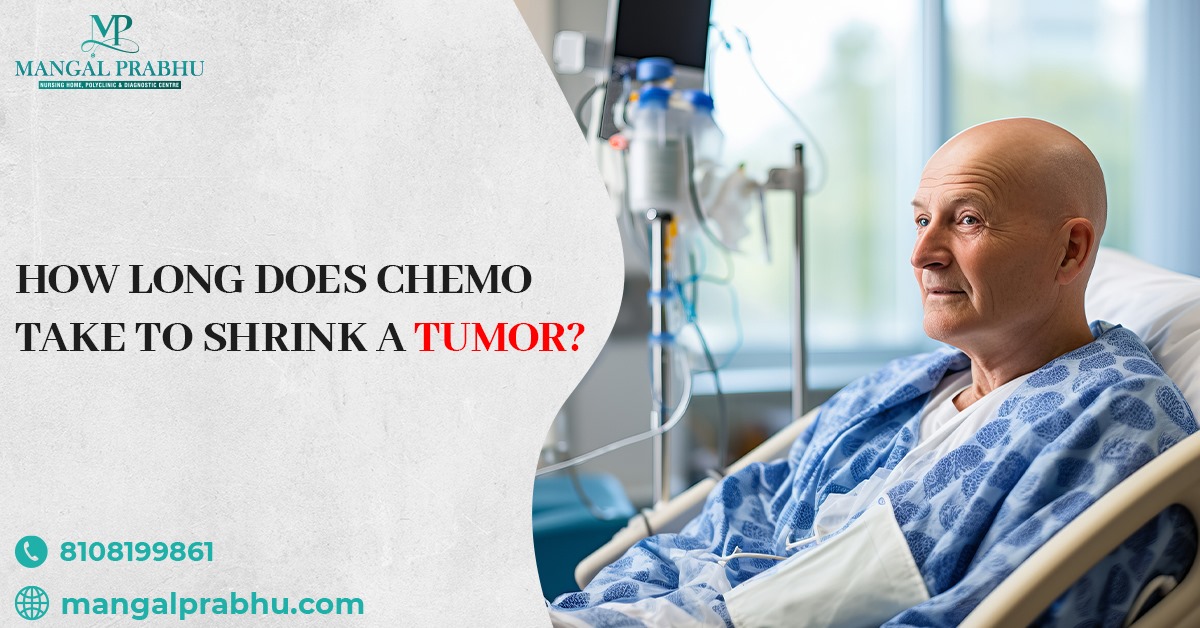
How Long Does Chemo Take To Shrink A Tumor?
What is Chemotherapy, and How Does it Work
Chemotherapy is a medical treatment that uses powerful drugs to target and destroy cancer cells. It is a widely used approach in cancer treatment, either as a standalone therapy or combined with other treatments such as surgery or radiation therapy. Chemotherapy works by interfering with the growth and division of cancer cells, ultimately leading to their death. Visit an Oncologist in Navi Mumbai at Mangal Prabhu Hospital to learn more about chemotherapy treatment and its need.
Factors that Affect How Long Chemotherapy Takes
The duration it takes for chemotherapy to shrink a tumor can vary widely from person to person and depends on several factors:
i) Type of Tumor
The type of cancer and its aggressiveness play a significant role in determining how long chemotherapy will take to shrink a tumor. Some cancers respond more rapidly to chemotherapy than others.
ii) Size of Tumor
Larger tumors may require more time to respond to chemotherapy and show noticeable shrinkage. Smaller tumors may respond more quickly.
iii) Location of Tumor
The tumor’s location within the body can influence the time it takes for chemotherapy to have an effect. Tumors in easily accessible areas may respond more rapidly than those in challenging locations.
iv) Patient Health
A patient’s overall health and immune system strength can impact their response to chemotherapy. Patients in better health may tolerate and respond to treatment more effectively.
Treatment Options for Shrinking Tumors
Chemotherapy is just one of the treatment options available for shrinking tumors. The choice of treatment depends on the type and stage of cancer. Here are some common treatment options:
- Surgical removal of the tumor is often the first choice for solid tumors that are localized and haven’t spread. In some cases, surgery may be followed by chemotherapy to eliminate any remaining cancer cells.
- Radiation therapy uses high-energy rays to target and shrink tumors. Depending on the cancer type, it may be used with chemotherapy or as a standalone treatment.
- Immunotherapy enhances the body’s immune system to recognize and attack cancer cells. It has shown promising results in treating certain types of cancer.
Challenges Associated with Chemotherapy
While chemotherapy is a valuable tool in cancer treatment, it comes with challenges and potential side effects, including:
- Chemotherapy can cause various side effects.
- Some tumors may become resistant to chemotherapy over time, making it less effective.
- Chemotherapy is often administered in cycles, with rest periods in between. The overall duration of treatment can vary, ranging from a few weeks to several months or more.
Conclusion
The duration it takes for chemotherapy to shrink a tumor can vary based on several factors, including the type of tumor, its size, location, and the patient’s overall health. Chemotherapy is just one of the many treatment options available. Hence, you should choose the treatment after consulting with an oncologist specializing in cancer care.
At Mangal Prabhu Hospital, a leading Chemotherapy Center in Navi Mumbai, experienced oncologists work closely with patients to develop personalized treatment plans. Whether it’s chemotherapy, surgery, radiation therapy, or a combination of treatments, the goal is to provide the most effective and comprehensive care to combat cancer.
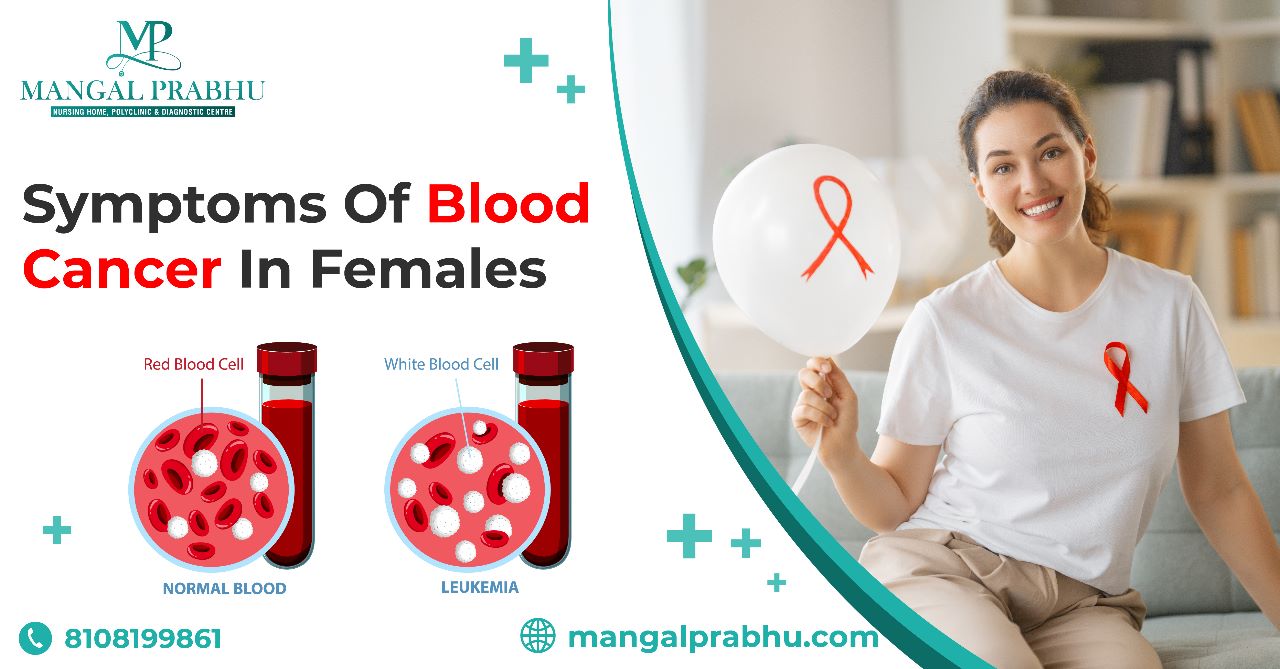
Symptoms Of Blood Cancer In Females
People with blood cancer usually experience symptoms very slowly, but it can spread in the body very quickly. However, if you encounter any sign of blood cancer, it would be best to acquire expert consultation from Mangal Prabhu Hospital, as they have the best hematologist in Navi Mumbai.
Definition of Blood Cancer
Blood cancer is a critical and life-threatening health-related issue that is often challenging to diagnose during the early stage. Blood cancer is a dangerous issue that involves the production of cancer-causing blood cells. The cancer-causing blood cells attack the healthy blood cells and interfere with the functioning of blood cells. Blood cancer can be categorized into various types.
Symptoms of Blood Cancer in Females
Symptoms of blood cancer are difficult to diagnose during its early stage, but some of the common symptoms of blood cancer in females are:
- Fever
- Pale skin fatigue
- Weight loss
- Easy bleeding or bruising
- Swollen lymph nodes
- Pain
- Frequent infection
However, symptoms of blood cancer in females may differ according to the different types. So let’s discuss the different types of blood cancer in females with its possible signs.
Signs of Leukemia
Leukemia is a common type of blood cancer that attacks white blood cells so they cannot fight against infection. Some of the signs of leukemia in females are:
- Easy nosebleeds
- Petechiae
- Dark urine
- Gum bleeding
- Jaundice
- Hepatomegaly
- Splenomegaly
Signs of Lymphoma
Lymphoma is when an abnormal cell attacks the lymph nodes so the body cannot fight potential infection again.
- Shortness of breath
- Fever
- Swollen lymph nodes
- Skin rash
- Cough
- Fatigue
- Unexplained weight loss
Signs of Myeloma
In myeloma, the blood cells affect plasma cells, so the body cannot produce antibodies. Some of the signs of myeloma in females are:
- Anemia
- Bone pain
- Infection
- Kidney issue
- Tingling or numbness
- Fatigue
- Weight loss
Diagnosis and Treatment
Mangal Prabhu is the best blood cancer hospital in Navi Mumbai that offers the best treatment plan and diagnoses the issue through a combination of tests. So, let’s see the variety of tests and treatment options for blood cancer.
Also Read: The Pros And Cons Of Chemotherapy: Is It Right For You?
Diagnosing Blood Cancer
- MRI
- CT scan
- Blood tests
- Bone marrow biopsy
Treatment Options
- Stem cell transplant
- Chemotherapy
- Radiation therapy
Coping with Blood Cancer
The treatment and diagnosis of blood cancer depends on the type and severity of the cancer. An individual has to take good care of their body besides having treatment. Patients require proper care and physical and emotional support from their friends and family to cope with blood cancer.
Managing Symptoms
Some of the ways to manage blood cancer symptoms are:
- Exercise
- Stay hydrated
- Eat healthy food and take proper rest
- Manage emotions
- Meditate and Yoga
Support Resources
Some support resources you can consider during treatment are:
- Joining a support group
- Talk to a therapist or take counseling
- Take care of mental and physical health
- Use relaxation techniques
Conclusion
Blood cancer is a severe condition, and its diagnosis is difficult. However, it would be best to consult the best hematologist when you experience any sign of blood cancer to get better treatment. When you opt for early diagnosis, it will help you to get through the blood cancer quickly and efficiently.
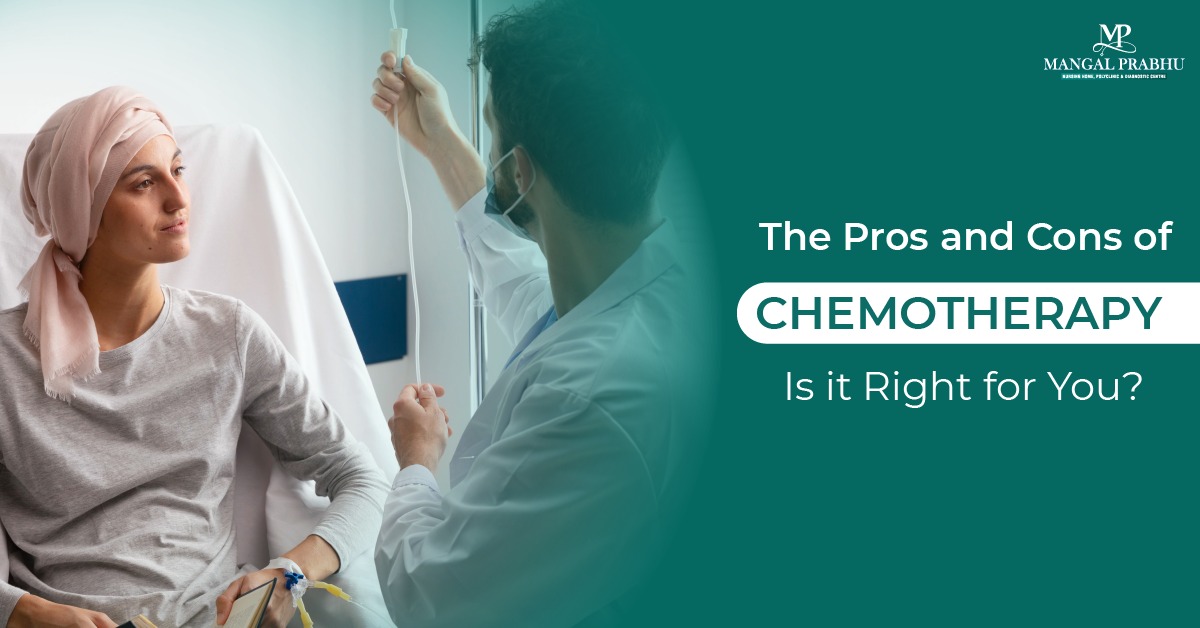
The Pros And Cons Of Chemotherapy: Is It Right For You?
Chemotherapy is the most effective treatment plan for treating and killing cancer cells by preventing their slowing and spreading growth. It is the most common cancer treatment to prevent tumor growth and destroy cancer cells. However, this guide will help you understand the advantages and disadvantages associated with chemotherapy so you can also make the right decision.
What is Chemotherapy & How Does It Work?
Chemotherapy is a kind of cancer treatment that is also known as chemo. It includes various drugs and treatment plans such as immunotherapy, hormone therapy, and targeted therapy against different types of cancer. Chemotherapy can also be paired with radiation therapy to cure cancer and ease its symptoms.
Chemotherapy works by destroying the cancer cells and stopping them from spreading. However, Mangal Prabhu Hospital is the best chemotherapy center in Navi Mumbai and uses the best tools and techniques to provide the fastest and most effective treatment. Their oncologist may use chemotherapy in various ways, including neoadjuvant, adjuvant, palliative, and curative therapy.
The Pros of Chemotherapy – Understanding the Benefits
Chemotherapy is very advantageous for cancer patients. Some of the benefits of this treatment are:
- It kills the cancer cells in the early stages of the disease.
- It reduces the intensity of the tumor before radiation therapy or surgery.
- Chemotherapy helps prevent and slow down the growth of cancer cells.
- Help in fighting the cancer cell, and other treatments work better.
- It made surgery possible by eliminating the cancer’s dead cells and reducing its spread.
Also Read: Chemotherapy: Types, Treatment, And Side Effects!
The Cons of Chemotherapy – Possible Side Effects & Risks
Chemotherapy not only kills cancer cells, but it also slows down the growth of healthy cells. It damages healthy cells and may cause side effects. However, some of the most common disadvantages and side effects of chemotherapy are:
- Hair loss
- Mouth sores
- Nausea
- Fatigue
- Patients must visit hospitals regularly to continue therapy, which can be tiring.
- It may not help all cancer patients.
- The recovery time and effects may differ from person to person.
Deciding Whether Chemotherapy is Right for You
Chemotherapy benefits all cancer patients or people with early signs of cancer but has some potential side effects. However, it would be best to decide and ask your loved ones whether you should start chemotherapy to treat your issue. It is the most effective way to treat cancer and may be very important for patients who do not need immediate treatment, such as prostate cancer or indolent lymphoma.
However, your physician may recommend chemotherapy if there is a sign that your cancer may grow in the future to prevent the cancer cells from spreading, or they may also suggest it if it has already spread to kill harmful cells.
Conclusion
If you have been diagnosed with cancer or it has already spread, it would be best to begin your cancer treatment as soon as possible. However, you can consider the best hematologist oncologist in Navi Mumbai, Mangal Prabhu Hospital, for the best cancer treatment. They offer the highest quality treatment with their standard healthcare plan at an affordable price, so everyone can get the best treatment without worrying about anything.
